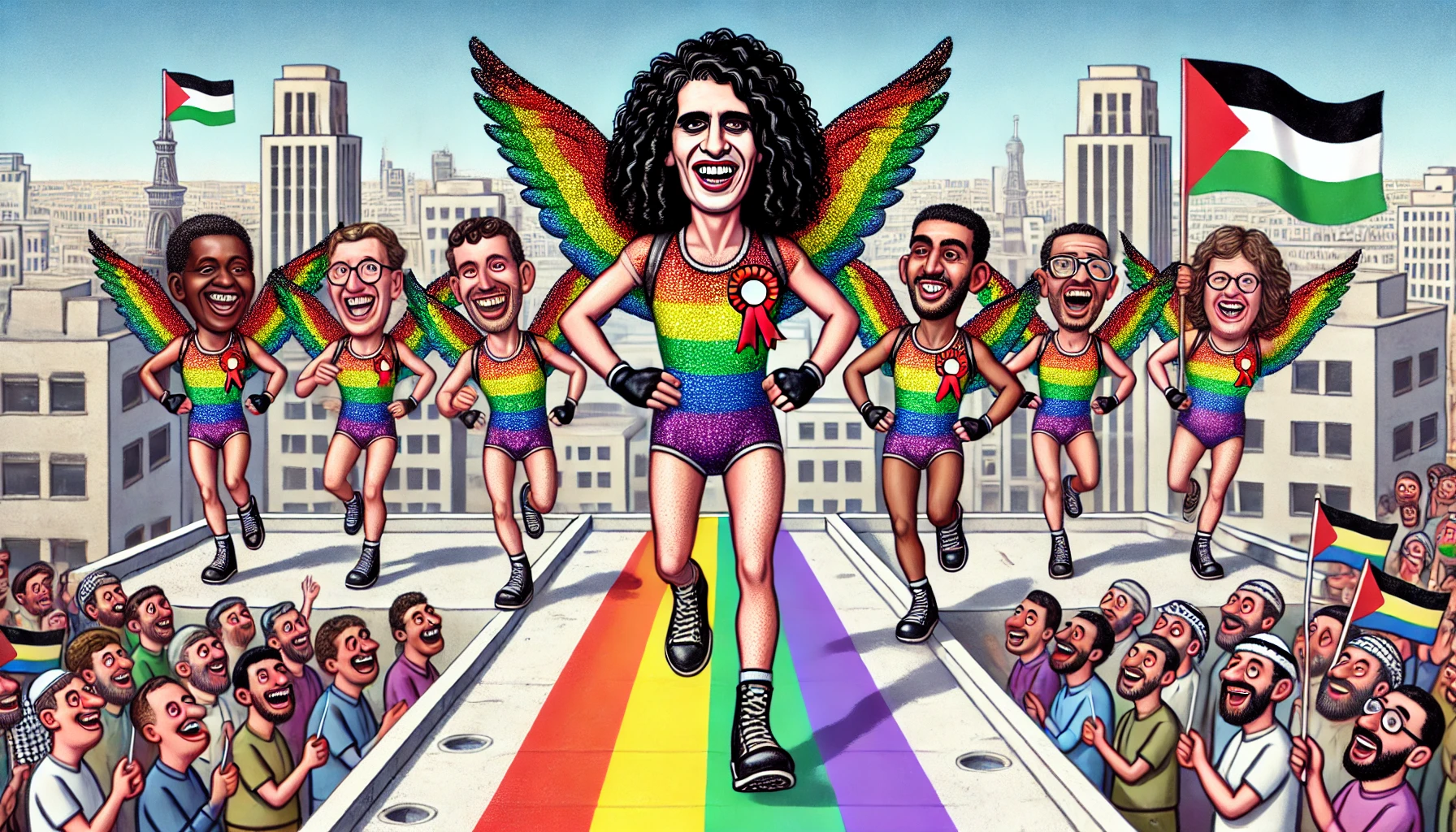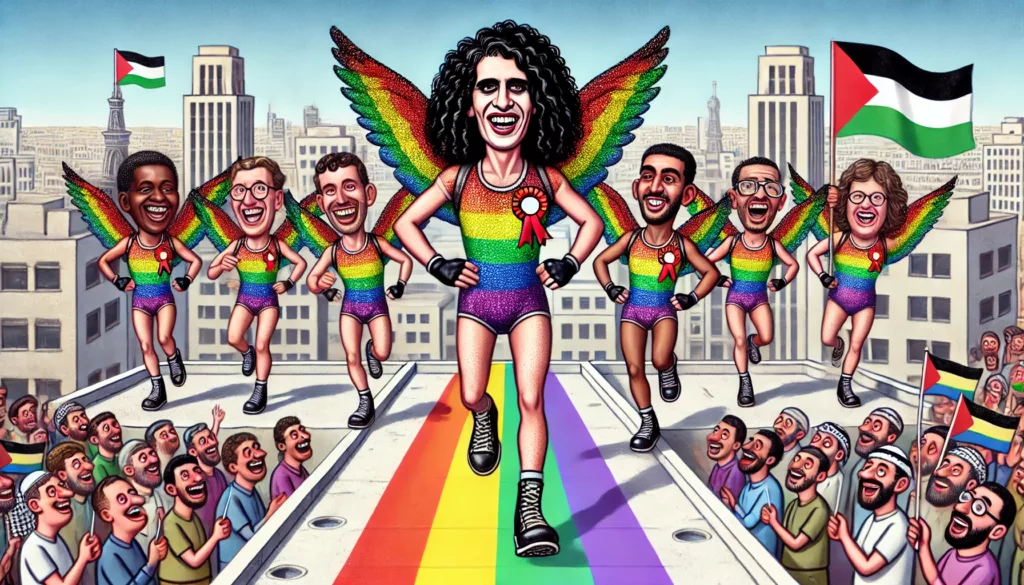
In recent years, there has been an unsettling trend in which certain factions of the LGBTQ+ community have aligned themselves with causes that, paradoxically, undermine their own rights and safety. A striking example of this is the growing support among some LGBTQ+ activists for the Palestinian cause and, more alarmingly, calls for a global intifada and the establishment of a caliphate. This alignment raises serious questions, especially given the documented hostility and persecution faced by LGBTQ+ individuals in many Islamic-majority regions.
The Double Standard on Anti-LGBTQ+ Hatred
While Western societies have made significant strides in promoting LGBTQ+ rights, it’s disconcerting to see the lack of attention given to anti-LGBTQ+ rhetoric and actions within some Islamic communities. Many Islamic-majority countries have strict laws that criminalize homosexuality, often under threat of severe punishment, including imprisonment and even execution. Yet, this reality is frequently overlooked or downplayed by those who otherwise champion LGBTQ+ rights.
The History of LGBTQ+ Rights in the West
The struggle for LGBTQ+ rights in the Western world has been long and arduous, marked by significant milestones and setbacks. From the Stonewall riots in 1969, which ignited the modern LGBTQ+ rights movement in the United States, to the legalization of same-sex marriage in many Western countries, the progress has been substantial. However, this progress did not come without a fight, and it required relentless activism, advocacy, and public awareness campaigns.
In contrast, many Islamic-majority countries continue to enforce strict laws against LGBTQ+ individuals. Countries like Saudi Arabia, Iran, and Nigeria impose severe penalties for homosexuality, ranging from imprisonment to death. Despite this stark contrast, there is a growing trend among some LGBTQ+ activists to support movements and causes that are inherently anti-LGBTQ+, such as the call for a global caliphate.

The Global Caliphate: A Threat to LGBTQ+ Rights
A global caliphate, as envisioned by certain radical Islamic factions, is fundamentally at odds with the values of tolerance and equality espoused by LGBTQ+ activists. Under such a regime, LGBTQ+ individuals would face extreme repression. This contradiction begs the question: why would LGBTQ+ activists support a cause that, if successful, would lead to their own persecution?
To understand this paradox, it is essential to delve into the motivations and underlying beliefs of these activists. Some argue that their support for the Palestinian cause, for instance, is rooted in a desire to champion human rights and oppose perceived injustices. However, this does not justify overlooking the anti-LGBTQ+ sentiments prevalent within these movements.
Case Study: Minnesota and the Somali Muslim Community
The situation in Minnesota provides a tangible example of this paradox. The state’s increasing Somali immigrant population, predominantly Muslim, has led to significant political shifts, including the election of Muslim officials. While diversity and representation are generally positive developments, there have been concerns about the potential for increased anti-LGBTQ+ sentiment within these communities.
In Minneapolis, for instance, the local government has seen the rise of officials who adhere to conservative Islamic values, which traditionally oppose LGBTQ+ rights. This shift has been met with little resistance from LGBTQ+ activists, who had previously campaigned for these very changes. This raises a critical question: are these activists aware of the potential consequences of their actions, or are they simply turning a blind eye to the inherent contradictions?
The Broader Implications
This phenomenon is not isolated to Minnesota. Across the Western world, there are growing instances of LGBTQ+ activists aligning with causes that are fundamentally at odds with their own interests. This trend highlights a broader issue: the failure to critically evaluate the implications of supporting movements that do not share the same commitment to equality and human rights.
The Complexity of Intersectionality
One possible explanation for this paradox lies in the concept of intersectionality, which seeks to understand how various social identities intersect and influence experiences of oppression and privilege. Intersectionality can provide valuable insights into the ways different forms of discrimination overlap. However, it can also lead to complex and sometimes contradictory alliances.
For instance, some LGBTQ+ activists may feel compelled to support marginalized groups, such as Palestinians, due to a shared experience of oppression. While this solidarity is well-intentioned, it can result in alliances with groups that hold fundamentally opposing views on LGBTQ+ rights. This raises important questions about the limits of intersectionality and the need for a more nuanced approach to activism.
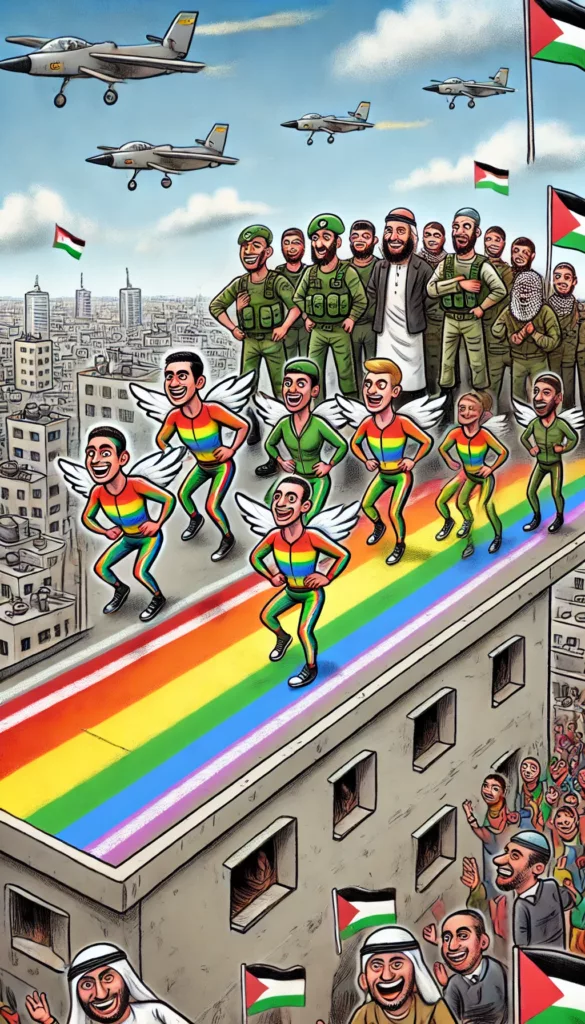
The Role of Political Correctness
Political correctness also plays a significant role in shaping these alliances. In an effort to avoid appearing prejudiced or intolerant, some activists may hesitate to criticize anti-LGBTQ+ sentiments within minority communities. This reluctance can create a double standard, where intolerance is condemned in some contexts but overlooked in others.
This double standard undermines the broader goals of the LGBTQ+ rights movement by allowing certain forms of discrimination to persist unchallenged. It also sends a message that some forms of oppression are more acceptable than others, which can weaken the overall fight for equality and justice.
The Influence of Identity Politics
Identity politics, which emphasizes the experiences and perspectives of marginalized groups, has become a powerful force in contemporary activism. While it has brought attention to important issues, it has also contributed to a fragmented and sometimes contradictory political landscape.
In the context of LGBTQ+ activism, identity politics can lead to alliances that prioritize certain identities over others. For example, an LGBTQ+ activist may align with a cause that opposes Western imperialism, even if that cause is associated with anti-LGBTQ+ sentiments. This prioritization can create conflicts and contradictions that undermine the broader goals of the movement.
The Importance of Consistent Advocacy
To address these contradictions, it is crucial for LGBTQ+ activists to maintain a consistent stance on human rights. This means holding all communities, regardless of cultural or religious background, accountable for their treatment of LGBTQ+ individuals. It also means critically evaluating alliances and ensuring that they do not compromise the core values of equality and justice.
One approach to achieving this consistency is to adopt a universal human rights framework that applies to all individuals, regardless of their identity or background. This framework should prioritize the protection and promotion of fundamental rights, including the right to live free from discrimination and persecution.
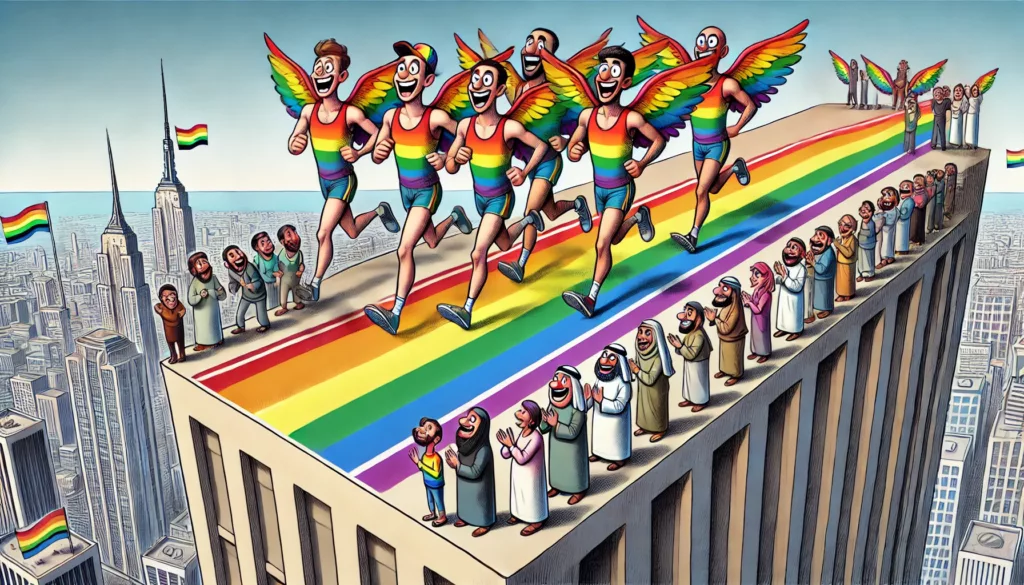
Addressing Anti-LGBTQ+ Sentiments in Islamic Communities
To address the specific issue of anti-LGBTQ+ sentiments within some Islamic communities, it is essential to engage in open and honest dialogue. This dialogue should involve LGBTQ+ activists, religious leaders, and community members, and it should aim to foster mutual understanding and respect.
Educational initiatives can also play a crucial role in challenging harmful stereotypes and promoting acceptance. These initiatives should be culturally sensitive and take into account the diverse experiences and perspectives within Islamic communities.
The Role of Media and Public Discourse
Media and public discourse also play a significant role in shaping perceptions and attitudes towards LGBTQ+ rights. It is essential for media outlets to provide balanced and accurate coverage of these issues, highlighting both the progress and challenges faced by LGBTQ+ individuals in different contexts.
Public discourse should also encourage critical thinking and the examination of underlying assumptions and biases. This can help create a more informed and nuanced understanding of the complex issues at play.
Moving Forward: Building Inclusive and Just Societies
The ultimate goal of LGBTQ+ activism should be to create inclusive and just societies where all individuals can live free from discrimination and persecution. To achieve this goal, it is essential to maintain a consistent commitment to human rights and to critically evaluate political alliances.
By addressing the contradictions and double standards within the movement, LGBTQ+ activists can strengthen their advocacy and ensure that it aligns with the core values of equality and justice. This requires a willingness to engage in difficult conversations, challenge harmful stereotypes, and prioritize the protection of fundamental rights for all individuals.
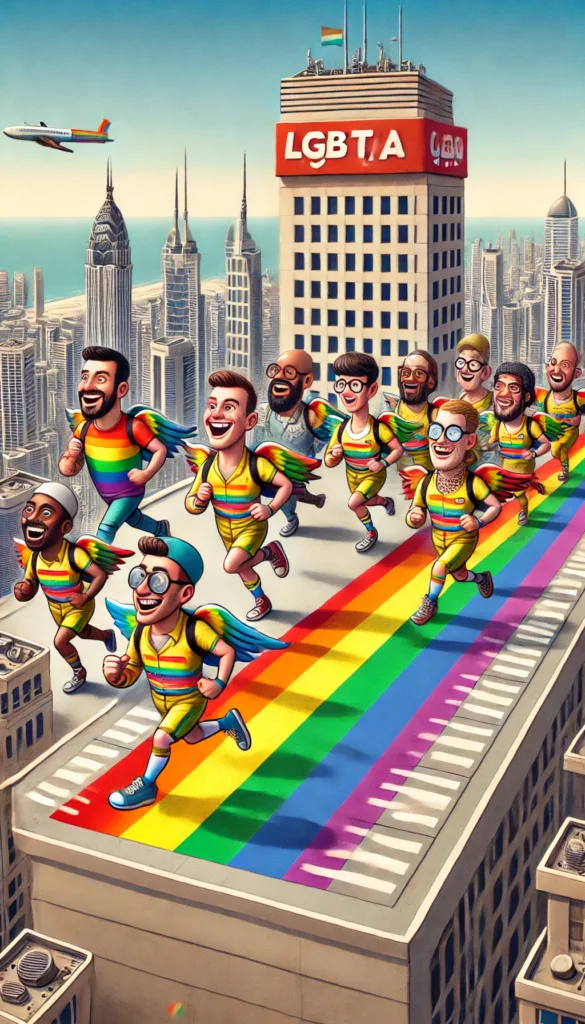
The Case of Nadia Whittome
A pertinent example of the hypocrisy in public office is Nadia Whittome, a British MP and outspoken advocate for women’s rights. Whittome is also a vocal supporter of the Palestinian cause, which is notable given the overwhelmingly anti-LGBTQ+ sentiments prevalent within the Palestinian population, as indicated by various surveys. Furthermore, the Palestinian territories are governed by Hamas, a radical Islamic organization designated as a terrorist group by many countries, including the United States and the European Union.
Hamas is notorious for its brutal treatment of LGBTQ+ individuals, including reports of people being thrown from buildings for being gay. This raises a critical question: how can a politician who claims to champion equality and human rights support a cause associated with such extreme anti-LGBTQ+ violence?
The case of Nadia Whittome illustrates a troubling trend among some activists and politicians who appear to prioritize political alliances over consistent advocacy for human rights. This inconsistency undermines their credibility and raises questions about their motivations and commitment to the principles they espouse.
Conclusion: A Call for Consistency and Awareness
The paradox of LGBTQ+ activists and politicians supporting causes that undermine their own rights highlights the need for greater consistency and awareness within the movement. It is crucial for activists to critically assess the implications of their political alliances and to ensure that their advocacy remains firmly rooted in the principles of equality and human rights for all.
Support for causes that undermine one’s own rights is not only counterproductive but also perilous. It is essential for the LGBTQ+ community and its allies to maintain a consistent stance on human rights and to hold all communities accountable for their treatment of LGBTQ+ individuals. By doing so, they can create a more inclusive and just society for everyone.
References ALL BEEN WIPED from the internet>!!
- Human Rights Watch Report on LGBTQ+ Rights in Islamic Countries
- The Guardian: The Double Standard on LGBTQ+ Rights
- Minnesota Star Tribune: Somali Community and Political Shifts
- BBC: Nadia Whittome’s Political Stances
- Amnesty International: Hamas and LGBTQ+ Rights
By examining the complexities and contradictions within the LGBTQ+ rights movement, this article aims to foster a deeper understanding of the challenges and opportunities for creating a more inclusive and just society. Through critical evaluation and consistent advocacy, the movement can continue to progress towards its ultimate goal of equality and justice for all.
